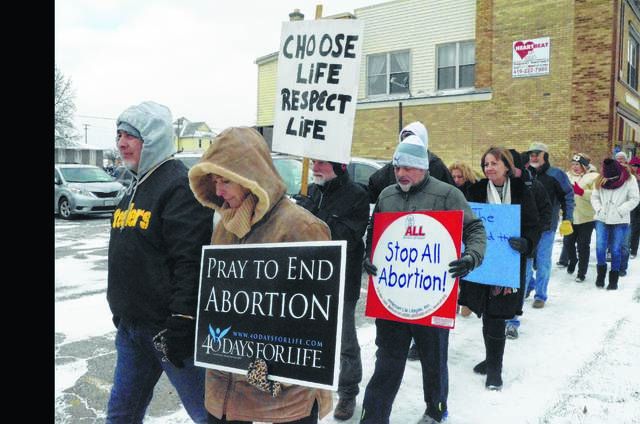Click here to subscribe today or Login.
The Catechism of the Roman Catholic Church is crystal clear on the subject of abortion: It is a “moral evil,” and has been considered such for 2,000 years.
The Catechism, a written work that contains a summary of all the beliefs of the faith, also makes clear the penalty for those who obtain an abortion, as well as those who facilitate the act.
“Formal cooperation in an abortion constitutes a grave offense,” the Catechism states. “The Church attaches the canonical penalty of excommunication to this crime against human life.”
But what is written and what actually happens can be two different things, and there are certain exceptions under church law.
Such would seem to be the case with the Rev. Thomas D. Skotek.
Skotek case
In the 1980s, Skotek sexually assaulted and impregnated a minor female and helped her obtain an abortion, according to the report of a statewide grand jury that documented child abuse by 301 priests in six Pennsylvania dioceses, including the Diocese of Scranton.
Skotek remains a Roman Catholic priest, albeit removed from active ministry for the past 16 years.
Diocesan spokesman Bill Genello confirmed Thursday that Skotek’s case previously was referred to the Congregation for the Doctrine of the Faith. That Vatican panel defends Catholic doctrine, including investigations into serious crimes committed by clergy.
“The Congregation reviewed the case and decided not to pursue it,” Genello said. “He was not laicized.”
Laicization is the Catholic term for removing a priest or other cleric from the clergy — what laypeople call “defrocking.”
So not only was Skotek not excommunicated for assisting the girl in obtaining an abortion, he has never even been removed from the priesthood.
In 1989, three years after then-Bishop James C. Timlin became aware of the incident, Timlin wrote to the Vatican on Skotek’s behalf.
“Conscious as I am of the severity of the crime he admits to, I nevertheless judge him worthy of consideration for a dispensation from this irregularity,” Timlin wrote.
“The priest in question undoubtedly acted out of fear and panic,” he added.
The Church’s canon law cites several exceptions in which the excommunication is not automatic.
One of them is for persons under 16, which could to apply to Skotek’s victim, depending on when the abortion occurred.
Another seems to echo Timlin’s words: “… a person who acted coerced by grave fear, even if only relatively grave, or due to necessity or grave inconvenience …”
While the Vatican’s response is not contained in the grand jury report, Timlin’s appeal apparently succeeded.
Skotek remained a priest, assigned to parishes in Wilkes-Barre and Mocanaqua, until 2002.
That year, he was removed from active ministry about four months after the diocese was contacted by the lawyer for a 47-year-old woman who claimed she was sexually abused by Skotek years before while attending Pocono Central Catholic High School, and working at the rectory at St. Mary’s in Mount Pocono.
“Skotek admitted to his conduct when confronted,” the grand jury report states.
Other cases
Elsewhere in America, and in other countries, clergy members and others who have facilitated abortions have not found church authorities so forgiving.
In November 2009, Sister Margaret McBride, a Roman Catholic nun who served as an administrator at St. Joseph’s Hospital and Medical Center in Phoenix, Ariz., gave her approval for an induced abortion to be performed on a pregnant 27-year-old woman who faced almost certain death due to complications if her 11-week pregnancy was allowed to continue.
According to reports by NPR and other sources, McBride consulted with the church’s ethical directives, and believed their actions would be justified, in this case, to save the mother, which doctors did.
McBride told Phoenix Bishop Thomas Olmsted as much. The diocese responded by declaring that McBride had automatically excommunicated herself, the Catholic News Agency reported. The hospital, meanwhile, lost its Catholic affiliation.
In December 2011, however, the hospital released a statement indicating that McBride had regained good standing with the Catholic Church. The diocese declined to comment, saying the matter was a personal one between McBride and the Church.
In 2009, a Brazilian woman obtained an abortion for her 9-year-old daughter, who was pregnant with twins after being sexually assaulted.
An archbishop declared that the woman and the doctors were excommunicated, creating an international uproar. He was overruled by the The National Conference of Bishops of Brazil and criticized by a top church ethical official in the Vatican’s own newspaper.
In 2016, Pope Francis gave all Roman Catholic priests the power to forgive abortion, something that was previously reserved for the pope, a bishop or a specially appointed priest, though that came well after the McBride and Brazilian cases — and Skotek’s.





